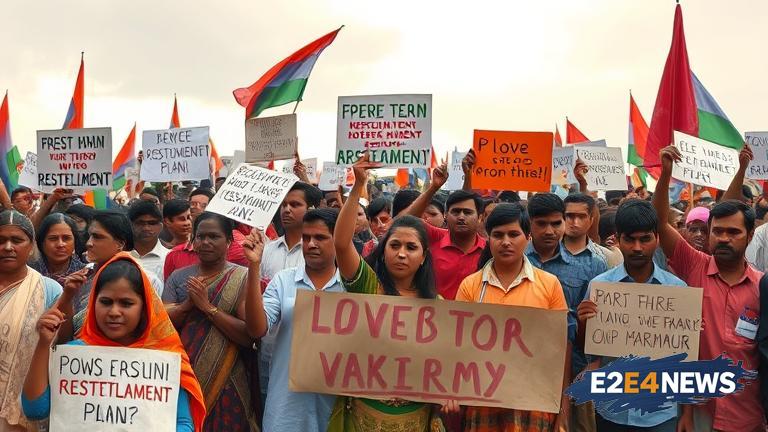The IDPs in Manipur have been protesting against the government’s resettlement plan, which they claim is inadequate and does not address their concerns. The protesters, who have been living in relief camps for years, are demanding a more comprehensive plan that takes into account their land ownership and compensation. The government’s plan, which was announced recently, proposes to resettle the IDPs in new locations, but the protesters are skeptical about the arrangement. They claim that the government has not consulted them properly and that the plan does not provide for their basic needs. The IDPs have been living in relief camps since 1997, when they were displaced from their homes due to ethnic clashes. Over the years, they have been struggling to survive, with limited access to basic amenities like food, water, and healthcare. The government’s resettlement plan is seen as a welcome move, but the IDPs are wary of the intentions behind it. They fear that the government is trying to push them out of their ancestral lands and settle them in areas that are not suitable for their livelihood. The protesters are demanding that the government provide them with a clear plan for their resettlement, including provisions for land ownership, compensation, and basic amenities. They are also demanding that the government consult them properly and involve them in the decision-making process. The IDPs have threatened to intensify their protests if their demands are not met. The government has assured them that it will look into their concerns and work out a plan that is acceptable to all parties. However, the IDPs are not convinced and are continuing their protests. The situation is tense, with the IDPs refusing to back down until their demands are met. The government is facing a tough challenge in trying to balance the needs of the IDPs with the larger interests of the state. The IDPs are a significant vote bank in the state, and the government cannot afford to ignore their concerns. The protests have highlighted the long-standing issue of displacement and resettlement in Manipur, which has been a major challenge for the government. The IDPs are not just fighting for their rights, but also for their dignity and self-respect. The government needs to take a more nuanced approach to address their concerns and work out a plan that is acceptable to all parties. The protests are a wake-up call for the government to take the concerns of the IDPs seriously and work towards a more inclusive and equitable solution. The IDPs are determined to fight for their rights, and the government needs to be more responsive to their needs. The situation is complex, and a solution will require careful negotiation and consultation with all parties involved. The government needs to be more transparent and accountable in its dealings with the IDPs, and work towards a solution that is fair and just. The IDPs are not just a statistic, but human beings who deserve dignity and respect. The government needs to recognize their rights and work towards a solution that addresses their concerns. The protests are a reminder that the government needs to be more responsive to the needs of its citizens, and work towards a more inclusive and equitable society.
